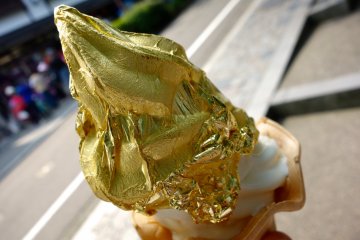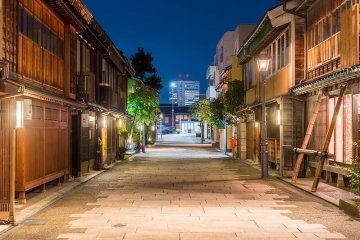

Kanazawa Castle is a partially-reconstructed castle located in Kanazawa, Ishikawa Prefecture. Up until the Meiji Restoration period in 1871, lords of the Maeda Clan occupied the castle. The castle building is part of the sprawling Kanazawa Castle Park, where you can also find the Kenrokuen Garden. In 2008, the castle was designated as a National Historic Site.
Most of the castle's original structures were burnt down during a fire in 1759. Unfortunately, another fire struck Kanazawa Castle in 1881, after several structures had already been rebuilt. Now, Kanazawa Castle has been steadily reconstructed to match how it looked in the 1850s.
20-minute bus ride from Kanazawa Station via the Kanazawa Loop Bus or Kenrokuen Shuttle Bus

Located within Kanazawa Castle Park in Ishikawa Prefecture, Kenrokuen Garden is one of Japan's most famous traditional landscape gardens. Together with Kairakuen and Korakuen Gardens, Kenrokuen Garden is one of the Three Most Beautiful Gardens of Japan. The gardens span 11.4 hectares, encompassing the Kasumigaike and Hisagoike ponds, Kotojitoro stone lantern, fountains, and seasonal foliage. Throughout the year, visitors can enjoy the sight of seasonal flowers such as plum blossoms, cherry blossoms, azaleas, and irises. During winter, the pine trees at Kenrokuen are protected using a special method called yukitsuri. Yukitsuri literally translates to "snow hanging", and is a method of arranging ropes in a conical shape to protect the tree branches from breaking due to the weight of the snow. Kenrokuen was named after the six factors that best bring out the beauty of a perfect landscape garden. The six factors are spaciousness, artificiality, antiquity, an abundance of water, beautiful garden views, and tranquility. Within the garden compounds, there are several teahouses, confectioneries, and restaurants. This shophouse-lined street is a popular spot during spring when the cherry blossoms are in full bloom.

The Higashi Chaya District (ひがし茶屋街) is a traditional teahouse district east of Kanazawa Station which known for its geisha performances. Comprising song and dance, these were a historical fixture at the local chaya teahouses since the Edo Period. This eastern district is just one of three in Kanazawa—alongside Nishi Chayagai and Kazuemachi—but Higashi is by far the largest and most well-known.

Nomura Samurai House (武家屋敷跡 野村家) is a historical family estate in the Nagamachi area of Kanazawa. This restored Edo period home reveals what it was like to live like a samurai, with its own tea ceremony room and enchanting Japanese garden.